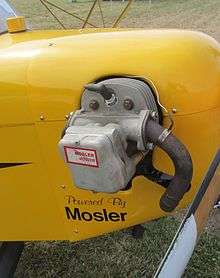Preceptor N3 Pup
The Preceptor N3 Pup is a family of ultralight, tube-and-fabric, high-wing, homebuilt aircraft. Kits were produced and marketed by Preceptor Aircraft, of Rutherfordton, North Carolina.[1][2][3][4][5][6] The company was operating on a limited basis, actively selling plans online,[7] but seems to have gone out of business in 2016.[8]
| N3 Pup | |
|---|---|
 | |
| Preceptor N-3 Puppy | |
| Role | Kit aircraft |
| Manufacturer | Preceptor Aircraft |
| Designer | Bob Counts |
| Status | Production completed |
| Number built | 1087 (total family of aircraft, 2011)[1] |
| Unit cost |
US$17,295 (kit, 2015) |
| Variants | Preceptor Stinger Little Wing Roto-Pup |
Designed to meet FAR 103 Ultralight Vehicles standards, the N3 Pup can accept various lightweight four stroke engines of between 37 and 60 hp (28 and 45 kW). If built to specifications with minimal additions, it can meet the requirements for a FAR 103 ultralight aircraft, with an empty weight of 254 lb (115 kg).[3][5] It may also be built as an amateur-built aircraft or US light-sport aircraft at higher weights.
Design and development

The Pup is designed to be flown cross-country and also can be mounted with floats and skis.[3]
The N3 Pup uses tube-and-fabric construction and a conventional 4-cycle engine. The fuselage and tail are welded from 4130 steel tube. There are two main wing configurations that can be built. An aluminum wing spar with hinges allows the wings to be folded for trailering or storage. A wooden wing spar configuration gives the plane a lighter weight, but leaves the wings fixed. The engine cowling is made from fiberglass.[3]
The aircraft has had many engine choices available, but was marketed to use the Half VW engine first developed by Global engines, later bought by Mosler engines and finally marketed by TEC engines.[9] The Total Engine Concepts MM CB-40 was the last purpose-built engine marketed for the Pup. The aircraft was sold as a partially prefabricated kit or can be built scratchbuilt from plans.[10]
The design was also adapted as an autogyro, the Little Wing Roto-Pup.[5]
Operational history
A N3 Pup modified to look like a Citabria named "Citabriette" won the Grand Champion Ultralight award at the EAA Oshkosh airshow 1988.[11]
Variants

- N3 Pup
- Single seat variant designed to resemble a 3/4 scale Piper J-3 Cub. Originally named the Nostalgair N-3 Pup. Engine is a TEC Half VW of 40 hp (30 kW). Meets FAR 103 requirements with an empty weight of 254 lb (115 kg) and gross weight of 535 lb (243 kg). 830 had been completed by December 2011.[1][2][5]
- Stinger
- Single seat variant with a parasol wing in place of the enclosed cabin, longer nose and larger engine. First flown in 1995. Engine is a Volkswagen air-cooled engine of 50 hp (37 kW). Gross weight of 550 lb (249 kg). Two had been completed by December 2011.[1][2][4][5]
- Super Pup
- Single seat variant with larger engine and higher empty weight, first flown in 1995. Engine is a Volkswagen air-cooled engine of 50 hp (37 kW). Empty weight of 330 lb (150 kg) and gross weight of 630 lb (286 kg). 55 had been completed and flown by December 2011.[1][4][5]
- Ultra Pup (N3-2)
- Two seat 3/4 scale Piper J-3 Cub, first flown in 1988 with a 35 hp (26 kW) MM-CB engine. Production engine is a Volkswagen air-cooled engine of 60 hp (45 kW). Empty weight of 450 lb (204 kg) and gross weight of 1,100 lb (499 kg). Folding wings for storage or ground transport. 200 had been completed and flown by December 2011.[1][4][5][12][13]
Specifications (N3 Pup)
Data from Manufacturer’s website[14] & Kitplanes[2][4]
General characteristics
- Crew: one
- Length: 16 ft 6 in (5.03 m)
- Wingspan: 30 ft 6 in (9.30 m)
- Height: 5 ft 0 in (1.52 m)
- Wing area: 120 sq ft (11 m2)
- Empty weight: 254 lb (115 kg)
- Gross weight: 535 lb (243 kg)
- Fuel capacity: 5 US Gallons (19 litres)
- Powerplant: 1 × Hummel Half VW 1037 cc four-stroke, two-cylinder horizontally opposed aircraft engine, 37 hp (28 kW)
- Propellers: 2-bladed wooden, 4 ft 6 in (1.37 m) diameter
Performance
- Maximum speed: 63 mph (101 km/h, 55 kn)
- Cruise speed: 60 mph (97 km/h, 52 kn)
- Stall speed: 27 mph (43 km/h, 23 kn)
- Range: 170 mi (280 km, 150 nmi)
- Service ceiling: 10,000 ft (3,000 m)
- g limits: +10.0/-3.0 ultimate
- Rate of climb: 600 ft/min (3.0 m/s)
- Wing loading: 3.76 lb/sq ft (18.4 kg/m2)
Avionics
- none
References
- Vandermeullen, Richard: 2012 Kit Aircraft Buyer's Guide, Kitplanes, Volume 28, Number 12, December 2011, page 65-66. Belvoir Publications. ISSN 0891-1851
- Downey, Julia: 2008 Kit Aircraft Directory, Kitplanes, Volume 24, Number 12, December 2007, page 65. Primedia Publications. ISSN 0891-1851
- Cliche, Andre: Ultralight Aircraft Shopper's Guide 8th Edition, page B-42. Cybair Limited Publishing, 2001. ISBN 0-9680628-1-4
- Downey, Julia: 1999 Kit Aircraft Directory, Kitplanes, Volume 15, Number 12, December 1998, page 62. Primedia Publications. ISSN 0891-1851
- Purdy, Don: AeroCrafter - Homebuilt Aircraft Sourcebook, page 224-225 and 326. BAI Communications. ISBN 0-9636409-4-1
- Tacke, Willi; Marino Boric; et al: World Directory of Light Aviation 2015-16, page 121. Flying Pages Europe SARL, 2015. ISSN 1368-485X
- "N3 Pup". Archived from the original on 19 June 2014. Retrieved 20 June 2014.
- "Internet Archive Wayback Machine". archive.org. Retrieved 13 May 2017.
- Global Machine Tool (US)
- "none". Sport Aviation: 98. October 1999.
- "EAA Oshkosh '88 Awards". Sport Aviation. October 1988.
- Bayerl, Robby; Martin Berkemeier; et al: World Directory of Leisure Aviation 2011-12, page 115. WDLA UK, Lancaster UK, 2011. ISSN 1368-485X
- "Mosler Two Place Pup". Air Progress: 25. February 1989.
- "N3 Pup". Preceptor Aircraft. Archived from the original on 15 July 2011. Retrieved 20 April 2010.
External links
| Wikimedia Commons has media related to Preceptor N3 Pup. |